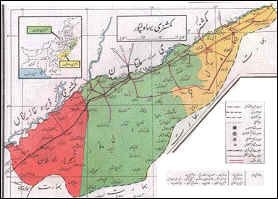Map:

Nawab Of Bahawalpur

Information
Bahawalpur is a historic city located in the Punjab province of Pakistan. Its history traces back to ancient times when it was part of the Indus Valley Civilization, evidenced by archaeological finds in the region. However, the modern history of Bahawalpur begins with the rise of the Abbasi tribe in the 18th century.
The Abbasi tribe, originally from the Persian Gulf, migrated to the region and established the princely state of Bahawalpur in 1702. The founder of the state, Bahawal Khan I, consolidated his power over the region and established Bahawalpur as an independent entity. The Abbasi rulers maintained friendly relations with the Mughal Empire, and later with the British East India Company.
During the British colonial period, Bahawalpur maintained its autonomy as a princely state under British suzerainty. The state prospered under the rule of various Abbasi rulers, who focused on developing infrastructure, agriculture, and trade. The construction of irrigation canals, such as the Sadiqia Canal, played a crucial role in transforming Bahawalpur into a fertile region known for its agricultural productivity.
Bahawalpur remained a princely state until the partition of India in 1947, when its ruler, Nawab Sadiq Muhammad Khan V, decided to accede to Pakistan. After the accession, Bahawalpur became part of the newly formed country of Pakistan, and Nawab Sadiq Muhammad Khan V served as the governor of the province.
In 1955, the Bahawalpur State was merged into the province of West Pakistan, and its status as a princely state came to an end. However, the legacy of the Abbasi rulers continues to be celebrated in Bahawalpur, with landmarks such as the Noor Mahal and the Bahawalpur Museum serving as reminders of its rich history.
Today, Bahawalpur is a thriving city known for its cultural heritage, historical landmarks, and economic significance. It serves as an important center for trade, agriculture, and education in the Punjab province of Pakistan.
Following its integration into Pakistan, Bahawalpur continued to develop as an important urban center within the country. The city experienced significant growth in various sectors, including education, healthcare, and commerce. Educational institutions such as the Islamia University Bahawalpur were established, contributing to the city’s reputation as an educational hub in southern Punjab.
Throughout the years, Bahawalpur has also retained its cultural significance, with festivals, traditional music, and art thriving in the region. The city’s architecture, influenced by its princely past, remains a point of interest for tourists and historians alike.
Economically, Bahawalpur plays a crucial role in Pakistan’s agricultural sector. The fertile lands surrounding the city support the cultivation of crops such as cotton, wheat, sugarcane, and fruits, contributing significantly to the country’s agricultural output. Additionally, industries such as textiles, chemicals, and food processing have emerged, further bolstering the city’s economy.
In recent years, efforts have been made to modernize and expand Bahawalpur’s infrastructure, including the construction of new roads, bridges, and industrial zones. These developments aim to attract investment, create employment opportunities, and enhance the overall quality of life for the city’s residents.
Despite facing challenges such as urbanization, environmental degradation, and economic disparities, Bahawalpur remains resilient, with its people striving to build a prosperous and sustainable future for generations to come. With its rich history, vibrant culture, and strategic location, Bahawalpur continues to be an integral part of Pakistan’s socio-economic landscape.
Nawab Of Bahawalpur With Quaid-E-Azam:

Last Message Of Nawab Of Bahawalpur:

Stamps Of Bahawalpur:

